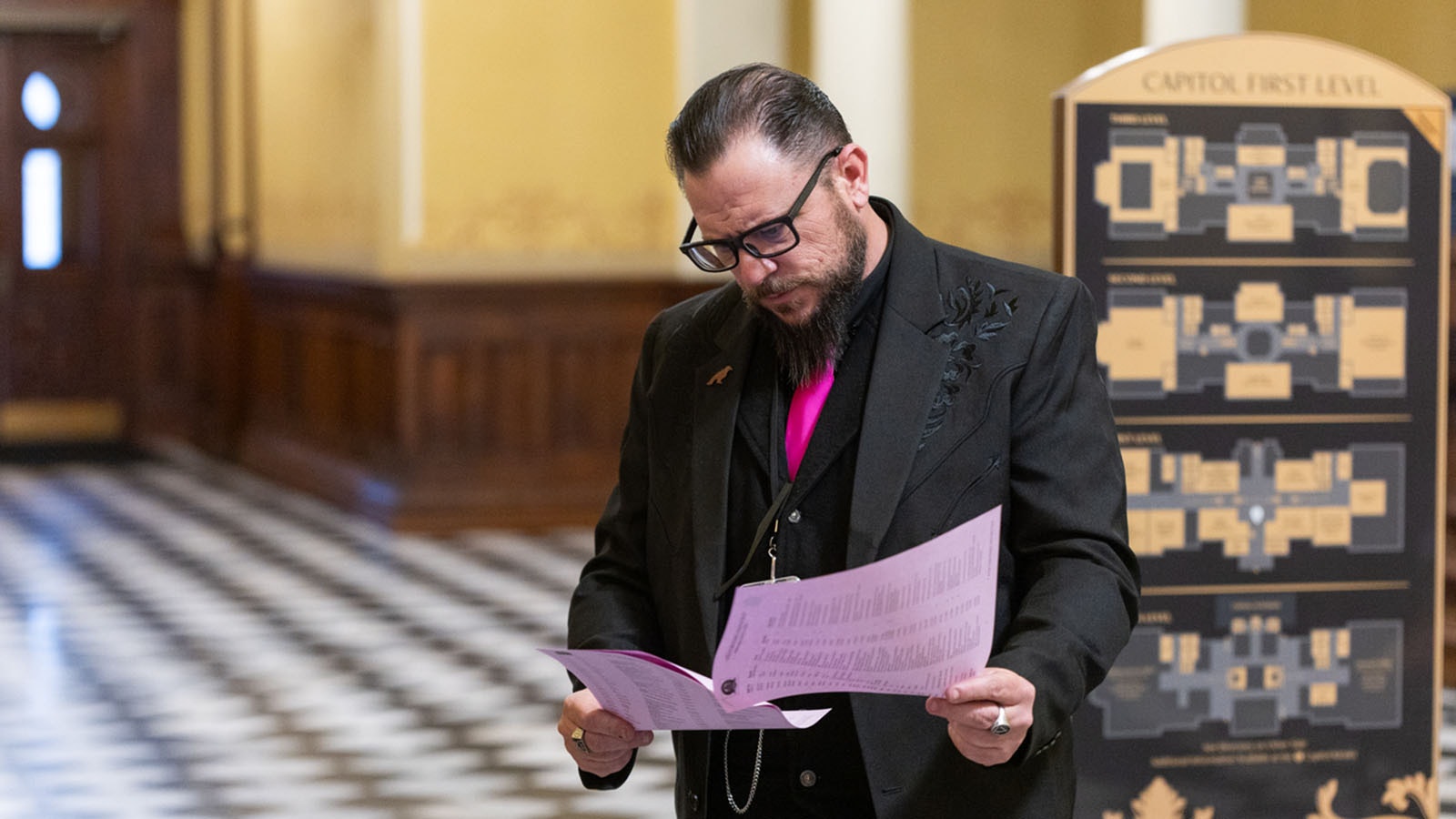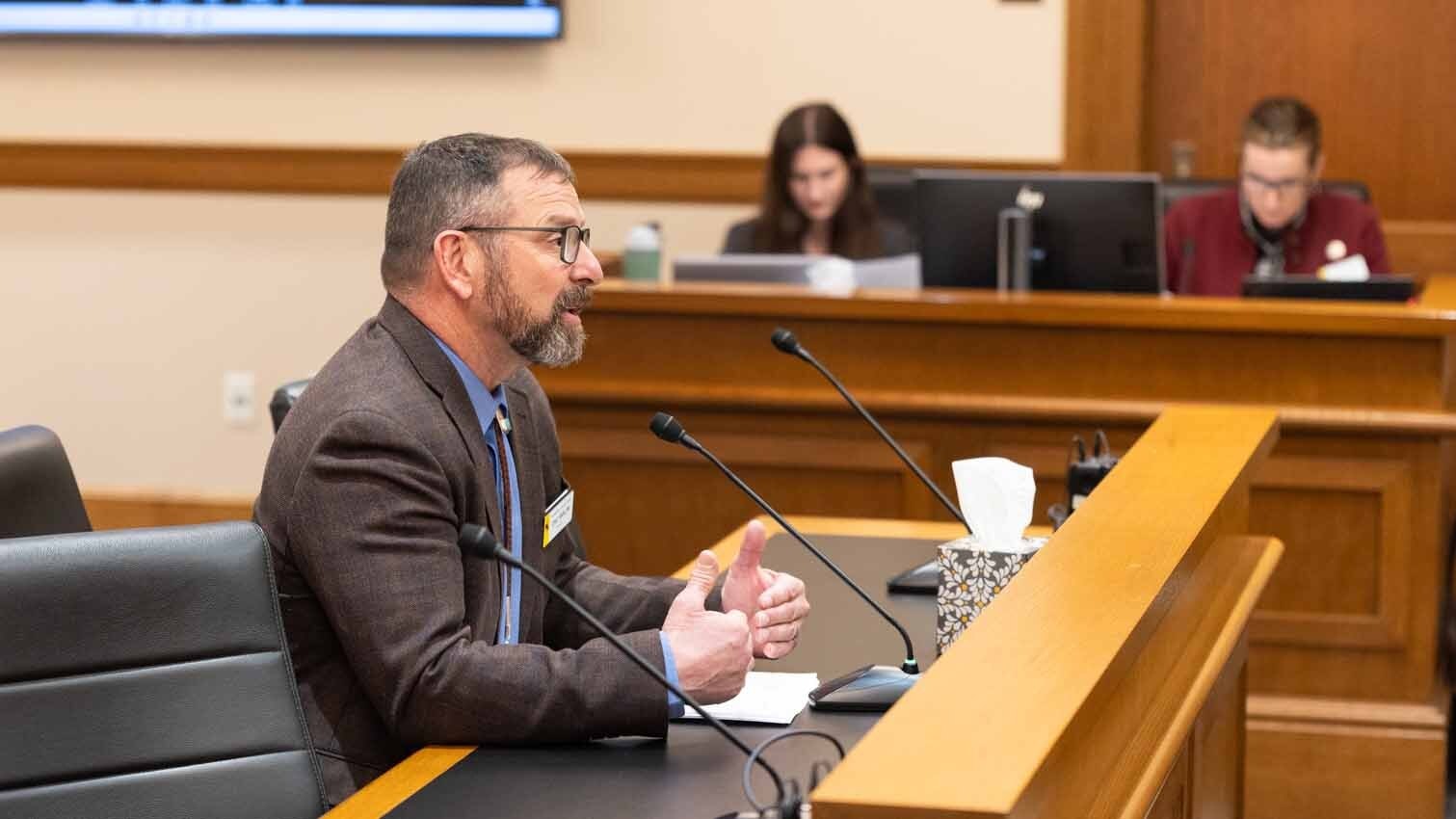The Wyoming Senate has passed what its leadership calls the largest property tax cut in Wyoming history.
Senate File 69 as passed on third reading Tuesday would slash taxes by 50% and offer no backfill money for local schools and governments. The bill passed on a 23-8 vote and now moves on to the House. The House already passed is own version of this bill on Jan. 23.
In a statement handed out as the bill was being voted on, Senate President Bo Biteman, R-Ranchester, said the bill sends a message to Wyoming voters they will get real action on property taxes instead of political grandstanding and out-of-state influence.
“If you are looking for drama, infighting, political grandstanding and interference from out-of-state special interests, there is plenty of that elsewhere,” Biteman wrote. “But here in the Wyoming Senate, we come together to do the work of the people, diligently and seriously. Today that serious work delivers results to the people of Wyoming.”
When asked about the statement by reporters after the vote, Biteman wouldn’t clarify which out-of-state interests he was referring to but indicated he believes they have pervaded the Wyoming House.
“You don’t see us putting out press releases every single day, we’re not tooting our own horn,” Biteman said. “We’re not attacking fellow members. We’re focused on the Senate, we’re focused on doing our job, and today we delivered, and that speaks for itself.”
Senate Majority Leader Tim Salazar, R-Riverton, called the bill “historic tax relief,” fulfilling a promise to his constituents and giving them what they asked for.
“This is the mechanism,” he said.
Sen. Bill Landen, R-Casper, also acknowledged the significance of the bill, telling his fellow senators they’ll remember their votes for years to come. Although he voted to support the tax cut, he admitted it will hurt local communities.
“If people don’t understand we’re cutting local services today, we have to help them understand it,” he said. “You can’t have your cake and eat it too.”
Concerns Raised
Many people who spoke against the bill Tuesday expressed concern about the fiscal impact it will have on their local schools and governments, as the bill will have at least a $288 million fiscal impact per year.
While speaking in favor of the bill on the floor, Biteman accused the Senate members opposing the cut of looking for excuses to not give property tax relief.
“Let’s not make perfect the enemy of the good,” Biteman said. “What the people wanted us to do is deliver.”
Sen. Tara Nethercott, R-Cheyenne, brought the amendment to restore the bill to a 50% cut, which was approved on a 19-12 vote. Nethercott stressed that the Legislature will have a multitude of ways to try and address the loss of tax revenue in the future, but did not provide a specific mechanism when speaking with reporters after the bill passed, other than a commitment to work with local communities.
Sen. Larry Hicks, R-Baggs, spoke against the bill, saying it would be better for the Legislature to let local governments reduce their mill levy rates and address the issue of cutting taxes themselves.
“We couldn’t stay in our own lane, we said we’re going to usurp those local governments,” he said. “Damn with the local governments, we don’t care what they say. What we’ve done is prescribe a one-size-fits-all that doesn’t work for everyone.”
Property tax growth in Wyoming has not been equitable with certain parts of the state experiencing much larger rate hikes than others. In counties like Teton, the growth has been huge, in some cases larger than 50% in annual raises. Others like Sweetwater and Niobrara counties saw much more modest bumps that were in line with Wyoming’s historical norms.
Sen. John Kolb, R-Rock Springs, agreed about subverting local control, saying his county hasn’t seen large property tax increases and his local government has made cuts, not expanded in recent years. He believes his local fire districts will be devastated as a result of the cut. Kolb said the cut should have been kept at 25%.
“I’m going to side with the people that I represent,” he said. “It doesn’t work for us, it’s too simple of an approach.”
Sen. Mike Gierau, D-Jackson, who voted in support of the bill, said reality and political rhetoric are colliding and at a crossroads, and Wyoming taxpayers must bear witness to the collision.
Sen. Charles Scott, R-Casper, disagreed, saying the state will be able to easily afford the tax cut as long as it restrains its spending. He believes a significant number of his constituents badly need the tax relief, as they’ve been hurt by inflation and home value increases.
Sen. Troy McKeown, R-Gillette, argued that the tax cuts will put more money into local economies because of the extra money people have to spend.
Schools Aspect
Sen. Evie Brennan, R-Cheyenne, who successfully amended the bill to a 25% reduction last week, spoke against the bill, saying it will put local students “in harm’s way.”
The bill will not directly cut education funding but will change the source of where that money comes from. About 70% of property tax revenue goes to local schools.
Sen. Chris Rothfuss, D-Laramie, pointed out that to fund education with the cut, it will create a larger dependence on the Legislative Stabilization Reserve Account.
He also said reducing property taxes while not cutting taxes on minerals is an insult to those industries, which provide about 50% of Wyoming’s overall revenue.
Rothfuss called the bill “irresponsible policy” and said his constituents are worried about what it will do for the future of education funding in Wyoming. Fixing the problem in the future, he said, will be a very tall order.
“We all know that’s it's an awful lot harder to pass a new tax,” he said.
Nethercott responded, criticizing Rothfuss’ home of Albany County as not representing the views of the state and said people in Wyoming genuinely need property tax relief.
“This is the request put forward by the people,” she said. “We will continue to work on this. This is not a solution in a vacuum.”
Horse Analogies
A handful of lawmakers used the analogy of riding a horse, as both a positive and negative, when describing the bill.
Hicks used the analogy of a sore-backed horse, saying the Legislature is putting a saddle on an aching back and attempting to ride it. Later, he added a new chapter to the horse saga and said the animal got stolen and “rode into town and killed.”
“The horse we’ve been given to ride creates winners and losers,” he said.
Sen. Bob Ide, R-Casper, spoke in favor of the amendment to increase the bill to a 50% cut, saying that it restores it to the original “horse we rode in on,” calling it good tax policy. He also mentioned how the bill will expire in 2027.
“The horse is going out to pasture in two years,” he said.
Sen. Stacy Jones, R-Rock Springs, also advocated for local control, saying the Legislature is “riding our neighbor’s horse” by passing the bill.
Backfill Rejected
Jones brought an amendment that would have left the bill as adjusted last week at a 25% cut and included a 12.5% backfill for local communities with $12.5 million in funding. She warned the cut will devastate the Rock Springs job sector, civic center, recreation center, softball complex, senior center and snow removal services.
“It’s a small amount, but to some of our small communities, it’s a devastating effect we’re taking down here,” she said.
To this, Ide brought up the horse again.
“Boy, this horse we chose to ride is losing its shoes, losing its legs,” he said. “I don’t know if we can get to the canteen at this point. We’re doing nothing but going backwards.”
Sen. Ogden Driskill, R-Devils Tower, compared the backfill to socialism, and said it would be an unsustainable path comparable to a state income tax. He, like Gierau, believes taxpayers will learn their lesson in the next two years.
The amendment died on a 20-11 vote.
Sen. Eric Barlow, R-Gillette, successfully passed an amendment allowing taxpayers to skip out on the exemption if they like.
There are a handful of other property tax bills still remaining, such as a bill to make property taxes in Wyoming based on acquisition value, which passed on first reading in the House on Tuesday afternoon.
Leo Wolfson can be reached at leo@cowboystatedaily.com.








